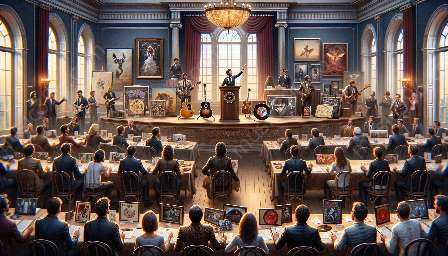Authenticity and value assessment in music memorabilia are influenced by psychological factors that shape collectors' perceptions. Understanding the psychological dynamics of autographed music memorabilia and its connection to music art and memorabilia can provide valuable insights into the complex nature of autograph authentication.
Impact of Authenticity on Value Assessment
One of the key psychological factors in assessing the value of autographed music memorabilia is the impact of authenticity. Collectors and enthusiasts place significant importance on the authenticity of autographed items, as it directly influences their perceived value. Authentication processes, such as verifying signatures and provenance, play a critical role in establishing the legitimacy of music memorabilia and, subsequently, their market value. The level of trust and confidence in such authentication processes significantly affects how collectors perceive the value of autographed music memorabilia.
Emotional Connection to Music Art and Memorabilia
Psychological factors also manifest in the emotional connection that individuals have with music art and memorabilia. Autographed items carry an inherent sentimental value, as they allow fans to feel closer to their favorite artists. The emotional attachment to music memorabilia, especially when autographed, can lead collectors to assign higher value to such items due to their personal significance and the connection to cherished musical experiences.
Cognitive Biases in Value Assessment
Moreover, cognitive biases can influence the perception of value when assessing autographed music memorabilia. Certain biases, such as anchoring bias and confirmation bias, may lead collectors to overvalue or undervalue autographed items based on subjective judgments and preconceived notions. Understanding these cognitive biases is crucial for collectors, experts, and appraisers to make objective and informed assessments of the value of autographed music memorabilia.
Role of Rarity and Demand
The psychological aspect of rarity and demand also plays a pivotal role in determining the value of autographed music memorabilia. Collectors are often swayed by the scarcity of autographed items, which creates a sense of exclusivity and desirability. The demand for specific autographed music memorabilia, driven by factors such as an artist's popularity or historical significance, can further influence the perceived value among collectors.
Trust and Reputation in Autograph Authentication
Trust and reputation are critical psychological considerations in the context of autograph authentication in music memorabilia. Authentication services and experts must establish and maintain trust through transparent processes and credible expertise. The perceived credibility and integrity of authentication services can significantly impact collectors' confidence in the authenticity and value of autographed music memorabilia, shaping their purchasing decisions and investment choices.
Conclusion
The psychological factors in assessing the value of autographed music memorabilia encompass a complex interplay of authenticity, emotional connection, cognitive biases, rarity, demand, and trust. Understanding these elements is essential for collectors, enthusiasts, and industry professionals to navigate the intricate landscape of autograph authentication in music memorabilia and gain a deeper appreciation of the psychological dynamics shaping the value of these cherished items.























